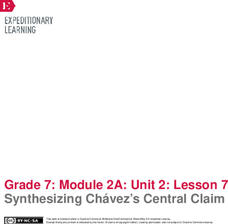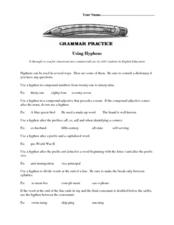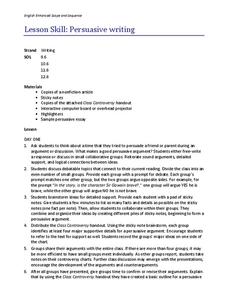Film English
Stand Up
To stand up can have many different meanings. Examine the different usages in English and relate one of these meanings to a short film about homophobic bullying. Class members view and discuss the film as well as a short reading passage...
Curated OER
Hamlet's State of Mind
Analyze various excerpts from Hamlet and read articles to develop an argument about his sanity. Middle and high schoolers write an argument essay defending whether or not they believe Hamlet is insane. You could modify this assignment...
Arizona State University
They're, Their, and They're
Clear up the difference between they're, their, and there once and for all! A reference sheets outlines when your learners can use each word, and ten practice sentences encourage them to fill the appropriate word in the blank. Use this...
Curated OER
Lesson Skill: Determining Audience and Purpose
“. . . the car looked as it had caught some terrible disease.” Pairs read and then illustrate a passage from either “The Year I Drove through the Car Wash” or “Riding Is an Exercise of the Mind” in preparation for a discussion of...
Virginia Department of Education
The Writing Process for Persuasive Writing
Get your junior high writers stimulated with the strategies and ideas available in this activity. Learners discuss and debate controversial subjects, and outline their reasons with an online graphic organizer (link included) that creates...
English Enhanced Scope and Sequence
Differentiate between Formal and Informal Language
The Pledge of Allegiance, the Gettysburg Address, the National Anthem, and the Preamble to the Constitution all get close attention in an exercise that asks learners to rewrite these formally-worded documents into informal language....
EngageNY
Synthesizing Chávez’s Central Claim
Class members play an interactive game, matching strips of paper containing rhetorical devices with examples from César Chávez use rhetoric in his 1984 speech, "Address to the Commonwealth Club of California." Next, partners discuss...
EngageNY
Finding Relevant Information and Asking Research Questions: The Benefits of Video Games
Video games may not be so bad after all. As scholars read the text "The Many Benefits, for Kids, of Playing Video Games," they summarize the gist in their researchers' notebooks. Next, pupils draft supporting research questions based on...
Curated OER
Compound and Complex Sentences
Does your class need to work on compound and complex sentences? Consider this worksheet! This fine worksheet has learners use connecting words to join 8 sentences, so that simple sentences become compound and complex sentences. They also...
Curated OER
Using Hyphens
Teaching grammar can be so difficult! Help your class master how to use hyphens correctly. The first page details different places one would use a hyphen. On the second page, learners are introduced to two practice activities. In the...
Curated OER
Grammar Practice: Restrictive vs. Non-Restrictive Clauses
Go over the basics of restrictive and non-restrictive clauses with this grammar worksheet. After reviewing the concepts, as well as the definitions of parentheticals and appositives, young learners label ten sentences as restrictive or...
Curated OER
Whom, Who, and Whose
Who can tell the difference? Teach your class how to use who, whom, and whose - once and for all! One page provides an easy-to-understand instruction sheet, and the second page prompts learners to practice their grammar with thirteen...
Curated OER
Comma Practice Worksheet
Start by introducing your class to basic comma rules, and then give them this practice sheet. First, learners add commas where necessary, and then they write down which comma rule (or rules) used in each sentence. Great practice!
Curated OER
Locating Information Quickly in a Variety of Resources
Here is a lesson which may be best suited for a library science teacher, or one that can be done by a regular teacher when in the library. In it, learners explore the best ways to use print and electronic resources to find information...
Curated OER
Meter in Poetry
A good poem has form and structure built into it. Middle schoolers see that the structure of a poem consists of stanza, form, rhyme, and meter. The structure also contributes to a poem's meaning. After listening to, and discussing, a few...
Virginia Department of Education
Identifying Audience and Purpose
Use a fun and creative activity to introduce junior high learners to how writing changes for different audiences and purposes. The activity begins with a reading by the instructor where teens visualize a food fight in the cafeteria. In...
Virginia Department of Education
Brainstorming to Write a Persuasive Essay on Demand
Equip your high school writers for the rigors of timed persuasive writing by employing the preparatory ideas available in this exercise. Learners use persuasive essays, provided by the educator, to acquire how to identify persuasive...
Virginia Department of Education
Writing for Workplace and Postsecondary Correspondence
Create or expand your college essay and career unit with a business and postsecondary writing activity. The exercise works for college-bound or job-hunting junior or senior learners. They bring their research concerning a college or...
Virginia Department of Education
Persuasive Writing
Grab a debatable (or controversial) moment from your current reading, and use this task to progress the persuasive writing skills of your high school scholars. Divide your learners into four small groups and let them collaborate, debate,...
EngageNY
Grade 9 ELA Module 1, Unit 1, Lesson 17
Eighth graders demonstrate their understanding with the final assessment in a literary analysis unit based on Karen Russell's short story, "St. Lucy's Home for Girls Raised by Wolves." Having prepared for the assessment in the last few...
EngageNY
Grade 9 ELA Module 2, Unit 2, Lesson 3
The manipulation of time is one of the most essential elements in Sophocles' Oedipus the King. As your language arts class participates in a jigsaw discussion activity, they work together to analyze the play's plot structure and...
EngageNY
Grade 9 ELA Module 2, Unit 2, Lesson 12
Ninth graders demonstrate their understanding of a central idea in Oedipus the King with a mid-unit writing assessment. Writers formulate a claim about the connection between prophecy and Oedipus's actions and craft an in-class essay...
EngageNY
Grade 10 ELA Module 4: Unit 2, Lesson 6
What decisions might an author make about the structure of a play? Pupils participate in an evidence-based discussion about Shakespeare's choices in Macbeth. Next, scholars analyze the effect of Shakespeare's structural choices in Act 2,...
EngageNY
Grade 11 ELA Module 1: Unit 2, Lesson 2
What tools did Shakespeare use to develop his characters in the play Hamlet? With the resource, pupils engage in a discussion about how the character Claudius introduces and develops Hamlet. They explain how word choices in Claudius's...
Other popular searches
- Kinesthetic Learner English
- Ell English Language Learner
- Esl Beginner Learner English
- Geometry English Learners
- English Learners Activities
- Anesthetic Learner English
- English Learners Math
- English Learner Rubrics
- English Learner Development
- English Learner Dialogue
- Music and English Learners
- English Learner Dialog























